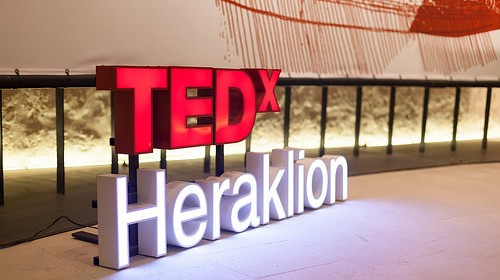Greece. So what’s the first thing that springs to mind? Well, unfortunately these days the ‘C’ word.
Crisis. The word actually comes from the Greek (
krisis). We’re all too aware of the financial troubles and EU arguing that is going on in the Peloponnese at the moment. It seems the Greek loans, austerity measures and budget discussions dominate the news headlines most days.
Well, I won’t be heading to the peninsula of Greece or Athens but to the island of Crete, to Heraklion, to give a TED talk about the revolution occurring for the new mobile creative class and the potential it offers for places around the world. Places like Heraklion and Greece.
Last time I was in Crete was over twenty years ago, exploring the ruins of Knossos, by all accounts Europe’s oldest city. I loved it, and felt pretty much at home and remember enjoying myself enormously.
Crisis. Never waste a good one
So how could I not talk about the crisis? In fact, as a place marketing person, my talk will focus on the fact that most great cities and places need a decent crisis before they get their act together. The saying ‘Never waste a good crisis’ certainly comes to mind.
War can certainly be deemed a crisis. But just look at what has come out of war. During the Second World War modern computing, an idea that had been kicking around since the 19
th century with Charles Babbage and his difference engine, was developed on both sides of the Atlantic simultaneously. In the US, with their ENIAC computer, to aid complex artillery ranging calculations and also at Bletchley Park in England, with their Colossus computer, developed to help crack the German Enigma codes.

Similarly, RADAR had been around as an idea for some time, but it took the crisis of the Second World War for British scientists to really turn it into a functioning technology. In fact, it was probably this very technology that helped Britain win the Battle of Britain in the air in the summer of 1940. We have RADAR to thank for the modern microwave as well, a technology that was discovered by accident when Percy Spencer, an American self-taught engineer, noticed that the chocolate bar he was carrying in his pocket had melted when he stood too close to the radar set he was working on. If all that isn’t enough, even FANTA, the fizzy orange drink, was developed out of crisis. After 1941, the Germans, understandably enough, were not able to get hold of the syrup they needed to make Coco-Cola. So the head of Coco-Cola Germany decided to create a new product, made out of what was available to them – oranges from North Africa. The name came about when they were brainstorming for the new product and the head of the company said they needed to use their imaginations more, or
Fantasie, as it’s said in German. And so – FANTA was born.
Crisis and Places
Crisis has been central when it comes to Place Marketing as well. Take the example of New York in the 1970s. The city and state were gripped by recession and still feeling the effects of the oil crisis. New York State was in the depths of a severe financial downturn and the City of New York was on the verge of bankruptcy, with the Federal Government, under President Ford, refusing to bail out the city or state. New York had a host of problems, in particular a surging crime rate, which was driving away tourists.
An action plan was urgently needed to generate revenue. They hit upon the idea to attract more tourists to the state and city by using a promotional campaign. The New York State Department of Commerce saw this as the quickest way to generate hard cash. That is when they developed the strategy of
Market today, visitors tomorrow. They recruited Milton Glaser, a famous local graphic designer, to work with them on a campaign and to develop a slogan and approach for the state and city to rally around. Glaser’s idea was very simple and focused on the one thing about NY that was most unique to it – its people. Its people and their passion for New York. This passion made New York a very special place. Glaser developed the now iconic
I love NY graphic and slogan. It was to become the most recognised, and copied, destination brand icon in the world.

The world’s most famous, and copied, city brand device.
Similarly, when I was recruited to work on the Stockholm branding back in 2002-2003 the city had been through a severe crisis. The dotcom bubble had burst and the fall out was spectacularly affecting the stock market and the city, which had stopped growing for the first time in many years.
After conducting our audit work, examining external research and running internal focus groups and workshops, we realised what the city needed most was a central focus. It needed a powerful new business proposition and an umbrella identity to work under. The primary target was tourism, and inward investment. We developed our napkin strategy (any good idea should be tight enough to be written on the back of a napkin) and declared Stockholm the most important place in Scandinavia for tourism and business. Based on our evidence, it was. Once this was signed off it was just a short creative step to the execution and positioning of
Stockholm as
The Capital of Scandinavia.
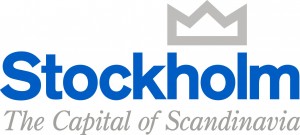
The Stockholm brand was also developed during a financial crisis.
So, inside the cloud of every crisis there can be a silver lining of an opportunity.
Personal Crisis
Now we all hit the odd personal crisis now and again. I tend to have one every time Liverpool loses a football match. That aside, I hit a more severe personal crisis a few years back. I was working for a company and had two things in my life I really felt weren’t adding to the overall quality of my life or well-being, or even my productivity and work.
The Boss
The first was having a boss. Now I’ve had a few bosses over the years and some have been very good and have actually helped me to develop as an individual. But there have been a few who have been lacking in this respect and, worse of all, were egocentric maniacs and control freaks. You really have to question the real function of a boss. In part, their job is managing processes but especially managing people. Added to that a major part of their focus tends to be measuring productivity – your productivity. Now it seems a bit of a waste of time in the 21st century to employ someone to look over someone else’s shoulder to check they aren’t slacking off. It suggests a certain lack of trust as well as the organisation in question lacking decent systems and processes to measure productivity and performance.
So do we all need a boss? Some people might, but I just don’t happen to be one of them.
Traffic
The other issue I had was concerning cars. Lots of cars in the form of traffic jams in the rush hour. I was sick of sitting in traffic jams on my way to the office. Yes, even in so-called
utopian Sweden, we have traffic jams. I was sitting in traffic everyday and commuting for up to two hours. And we had over 50 people doing the same as me everyday. Was that productive? As Ian Dury would say, ‘what a waste.’
So one day, stuck in a traffic jam, burning fuel and belching out CO2, I started working out how much time I was actually wasting in my daily commute.
The numbers were astonishing. Two hours per day, which was 10 hours per week, which when multiplied by my commute of 45 weeks a year was a mind-boggling 450 hours a year. That’s over 18 days each year.
What could I do with 18 more days a year? (If you want to get really silly with these sort of numbers you can give yourself a few other shocks as well. We all know the one about someone with an average life expectancy spending 25 years of their life in bed sleeping. But less well known is that the average American will spend 1.9 years sat in front of the television and a mere 48 days during their entire lives having sex. I stress these are
averages for typical Americans).
Anyway, back to my 18 days a year and realisation that bosses could be a waste of space.
1099 Economy. Over 50 Million Americans
So I quit. I decided to become independent. A freelancer. Now Americans talk about
The 1099 Economy, named after the IRS tax code people fall into if they are self-employed. The US Freelancers Union claims that today fully 34% of the entire US workforce fall into the 1099 tax code. If accurate, that’s 53 million people. That’s a lot of people and it’s still growing.
So I wasn’t alone. I started thinking about ways to use my 18 days a year. The first thought that sprang to mind was just lying in a hammock on a beach for a couple of weeks. That’d be better use of time than sitting in a traffic jam for sure. But it wouldn’t be very productive or valuable in the longer term.
I was also starting to question the whole logic of traditional employment itself. It’s actually a very 19
th century concept, and we all know nowadays, for a certain category of work, we don’t actually need to live close to
the factory or
office to be really productive.
Being independent and working on my own had certain appeals. Flexibility was the most attractive thing. But there were downsides. Firstly, and most practically, earning money. I was normally OK on this front, so that was not my major concern. The bigger downside was that being ‘
on my own’. I wouldn’t be able to compete as well when it came to larger jobs. Working alone, and I’d done this before, can also be a pretty lonely experience.
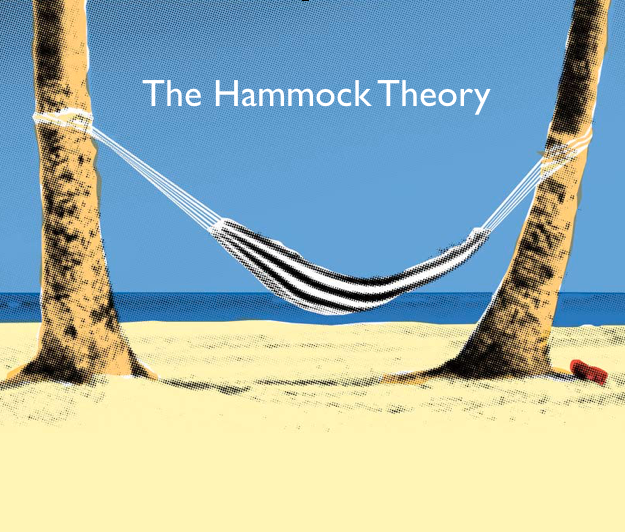
The Hammock Theory
That’s how I hit on the idea of the Hammock Theory. The thing was, in my line of work, I could actually sit and work anywhere I liked. Including in a hammock, should I wish. (I have to stress, I’ve tried working in hammocks and it’s not all it’s cracked up to be. Personally I find it impossible and extremely difficult on the Wi-Fi and power charging front. In fact it’s largely a myth).
But I could work from anywhere with the incredible tools now on offer through the cloud. Living and working from everywhere is now possible. There are great tools for communications like Facetime, Skype and Go To Meeting. Great tools for productivity like Basecamp and Team Gant. There are also incredible file back up and storage systems such as Drop Box. The cloud had once been a dream but it is now a reality and it actually works. I’d been using most of the cloud-based tools for years already, so moving further into the cloud was an easy step for me.
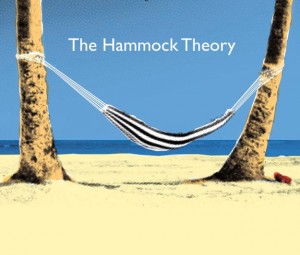
Now the On Demand Economy gets talked about a lot already these days, and people mostly mean the likes of Air BnB, Uber or Elance. These are big brands but not what I was personally after. I didn’t fancy renting out my room to a stranger. Equally I would make an awful taxi driver. I was looking for something more professionally focused. Elance has over a million people signed up, and obviously works for many people. But that didn’t deliver what I personally wanted. I was after something that would give me more than just an income. I wanted colleagues that I could work with closely, everyday, all around the world, just as in a regular company. People I’d interact with everyday. And an organisation that provided opportunities to grow and learn. I didn’t actually want to work for an organisation that would just sign up anybody. Instead, I wanted something much more selective in who was recruited, aimed at professionals like myself.
I knew plenty of people like me, very good people. What if we created an umbrella for us all to work under, in the cloud? We could create a brand and organisation to set a standard for the processes and systems we would jointly use. Working together we would be vastly more effective than working individually. And even with just the people I knew, like me, we could be global from day one.
That’s when, with a couple of close friends, we hit on the idea of UP THERE, EVERYWHERE. A global cloud based organisation, made for people who wanted to work together under one brand and with common tools. People who wanted to work globally and locally. People who would interact everyday if needed, just as in a regular company.
Anyone who wanted to join us would need to go through a number of interviews and be recommended, not for employment – because we would have no employees, but for membership.
Opportunities: For Business, For People
We’ve been working this way in UP for more than three years now and I can tell you it works. In a very short space of time, we’ve created in an operation with sales of over three million dollars a year. It’s not always easy, but it works far better, and provides more flexibility, than the alternative. From a business opportunity perspective this way of working enables organisations to be totally global, to operate extremely effectively and allows them to be hyper competitive. It’s an idea whose time has come for the service industries. As an important aside, it’s also extremely good for the environment. I’m not sitting in a car so often and I don’t need to go to an office everyday, again wasting precious resources. It’s made for the world we live in.
The opportunity for people is that it gives them the chance to
hang their hammock wherever they want. Depending on each person’s personal situation and skill set, they can live and work wherever they want and still be totally connected to their team and clients. I live in Stockholm and , part from Sweden, work everyday with clients in Switzerland, England, Holland, California and more. And I do it with a team who works in the exact same way. Now that’s pretty cool, but more importantly it’s extremely effective. I’m certainly free of
‘the boss’ but the biggest benefit I see personally is the flexibility it gives me over my time and life. I can now schedule my work around the other important things in my life, like picking my son up from school and getting the chance to kick a football with him for an hour. Then I go right back to work.
The biggest demand of working this way is self-responsibility. If you are truly going to make this work for you, you have to take self-responsibility to a new level. You need to have self-responsibility for your life, income, work and colleagues.
Opportunity for Places
Finally there are huge opportunities for cities, municipalities and countries that are looking to attract this new breed of mobile creative class, or
E-Ployees as we call them, who work in the cloud. Despite working in the cloud, these people still pay their taxes on the ground.
Places like Heraklion and Greece could benefit enormously from attracting people like this. Places need to examine their assets and consider what it takes to attract this new breed of worker. Consider a place like Heraklion. They have a great diet, lower overall living costs than most places and a warm and sunny climate (as an aside, in Stockholm last November we achieved 4 hours of sunlight for the entire month. In Sweden in winter we have more than fifty shades of grey).
But to make all this work, places need to make sure certain things are in place and easily available. There’s no such thing as a free lunch, even if it’s a feta and sardine salad. The first must have is free, high speed broadband. It’s the oxygen for
E-Ployees. The other thing is great infrastructure or planes, trains and Teslas (if you get my drift). E-Ployees are a highly mobile bunch and move around their world a fair bit, both for work and leisure.
Also important is a very low level of bureaucracy and corruption. That’s one of the benefits of living in a place like Sweden (in Sweden politicians are considered totally corrupt if they get caught a putting a Mars Bar on their expense account). We also seek tolerant, open societies with high levels of cultural attractiveness. Things like theatre, music, museums, coffee shops, restaurants and the opportunity to socialise easily together. Great ideas come out of those interactions and when you are working remotely in the cloud, you need those other social interactions even more. Additionally, a truly international environment is important. E-Ployees tend to be a global lot and feel most at home in international environments. We’re global citizens and we like living in places that reflect that. Finally, places need to make it easy for people to vote with their feet. Make moving to a city, municipality or country easy. Provide simple and straightforward information on the ins and outs of moving to a place, provide help and keep it as simple as possible.
I think we live in an exciting time. We’ve had the agricultural revolution, the industrial revolution and more recently the technological revolution. All affected the way we live and where we live. We believe there is a new revolution about to happen. We no longer need to live close to the factory or office. We no longer need to work in organisations and companies designed for the 19th century. For employees and freelancers seeking a better, closer, way of working we believe they will find it through the cloud and by working together in close organised communities.
Where will you hang your hammock?
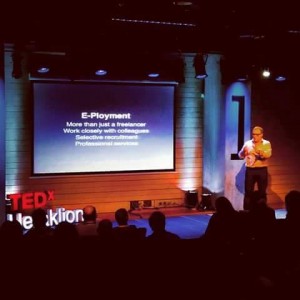
Julian Stubbs
Quote from Julian Stubbs
‘We’ve been working this way for more than three years now. We’ve put in place the processes and systems to make this way of working through the cloud possible. We’ve gone from two individuals to 200 people working under one global brand and organisation: UP THERE, EVERYWHERE. Within the next couple of years we estimate we’ll be somewhere around 500 to 600 people. People who can decide more than ever before where they want to live’.
TedX Heraklion
This blog is based on the TED talk by Julian Stubbs, given in Heraklion, Greece, February 28th 2015. The film will be available on the TED channel in late March 2015.
 Similarly, RADAR had been around as an idea for some time, but it took the crisis of the Second World War for British scientists to really turn it into a functioning technology. In fact, it was probably this very technology that helped Britain win the Battle of Britain in the air in the summer of 1940. We have RADAR to thank for the modern microwave as well, a technology that was discovered by accident when Percy Spencer, an American self-taught engineer, noticed that the chocolate bar he was carrying in his pocket had melted when he stood too close to the radar set he was working on. If all that isn’t enough, even FANTA, the fizzy orange drink, was developed out of crisis. After 1941, the Germans, understandably enough, were not able to get hold of the syrup they needed to make Coco-Cola. So the head of Coco-Cola Germany decided to create a new product, made out of what was available to them – oranges from North Africa. The name came about when they were brainstorming for the new product and the head of the company said they needed to use their imaginations more, or Fantasie, as it’s said in German. And so – FANTA was born.
Similarly, RADAR had been around as an idea for some time, but it took the crisis of the Second World War for British scientists to really turn it into a functioning technology. In fact, it was probably this very technology that helped Britain win the Battle of Britain in the air in the summer of 1940. We have RADAR to thank for the modern microwave as well, a technology that was discovered by accident when Percy Spencer, an American self-taught engineer, noticed that the chocolate bar he was carrying in his pocket had melted when he stood too close to the radar set he was working on. If all that isn’t enough, even FANTA, the fizzy orange drink, was developed out of crisis. After 1941, the Germans, understandably enough, were not able to get hold of the syrup they needed to make Coco-Cola. So the head of Coco-Cola Germany decided to create a new product, made out of what was available to them – oranges from North Africa. The name came about when they were brainstorming for the new product and the head of the company said they needed to use their imaginations more, or Fantasie, as it’s said in German. And so – FANTA was born.
 Now the On Demand Economy gets talked about a lot already these days, and people mostly mean the likes of Air BnB, Uber or Elance. These are big brands but not what I was personally after. I didn’t fancy renting out my room to a stranger. Equally I would make an awful taxi driver. I was looking for something more professionally focused. Elance has over a million people signed up, and obviously works for many people. But that didn’t deliver what I personally wanted. I was after something that would give me more than just an income. I wanted colleagues that I could work with closely, everyday, all around the world, just as in a regular company. People I’d interact with everyday. And an organisation that provided opportunities to grow and learn. I didn’t actually want to work for an organisation that would just sign up anybody. Instead, I wanted something much more selective in who was recruited, aimed at professionals like myself.
I knew plenty of people like me, very good people. What if we created an umbrella for us all to work under, in the cloud? We could create a brand and organisation to set a standard for the processes and systems we would jointly use. Working together we would be vastly more effective than working individually. And even with just the people I knew, like me, we could be global from day one.
That’s when, with a couple of close friends, we hit on the idea of UP THERE, EVERYWHERE. A global cloud based organisation, made for people who wanted to work together under one brand and with common tools. People who wanted to work globally and locally. People who would interact everyday if needed, just as in a regular company.
Anyone who wanted to join us would need to go through a number of interviews and be recommended, not for employment – because we would have no employees, but for membership.
Now the On Demand Economy gets talked about a lot already these days, and people mostly mean the likes of Air BnB, Uber or Elance. These are big brands but not what I was personally after. I didn’t fancy renting out my room to a stranger. Equally I would make an awful taxi driver. I was looking for something more professionally focused. Elance has over a million people signed up, and obviously works for many people. But that didn’t deliver what I personally wanted. I was after something that would give me more than just an income. I wanted colleagues that I could work with closely, everyday, all around the world, just as in a regular company. People I’d interact with everyday. And an organisation that provided opportunities to grow and learn. I didn’t actually want to work for an organisation that would just sign up anybody. Instead, I wanted something much more selective in who was recruited, aimed at professionals like myself.
I knew plenty of people like me, very good people. What if we created an umbrella for us all to work under, in the cloud? We could create a brand and organisation to set a standard for the processes and systems we would jointly use. Working together we would be vastly more effective than working individually. And even with just the people I knew, like me, we could be global from day one.
That’s when, with a couple of close friends, we hit on the idea of UP THERE, EVERYWHERE. A global cloud based organisation, made for people who wanted to work together under one brand and with common tools. People who wanted to work globally and locally. People who would interact everyday if needed, just as in a regular company.
Anyone who wanted to join us would need to go through a number of interviews and be recommended, not for employment – because we would have no employees, but for membership.
